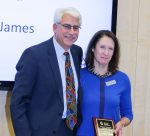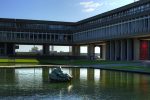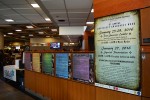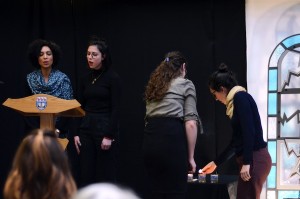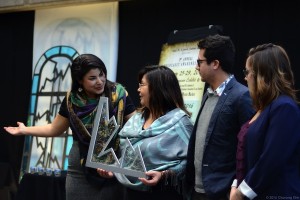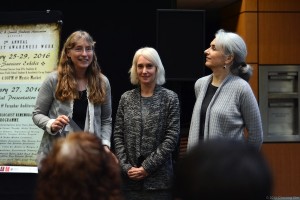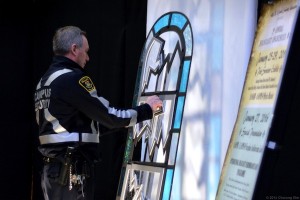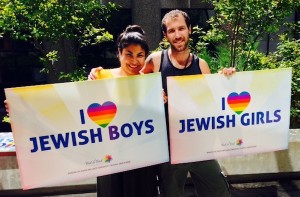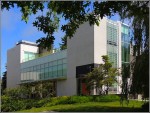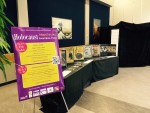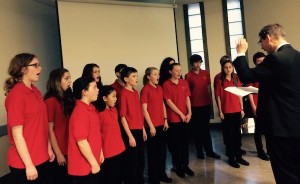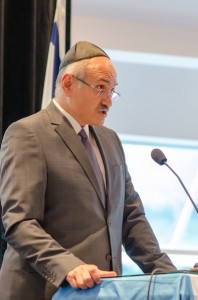Jewish Family Services CEO Richard Fruchter with Karen James, who received the 2017 Naomi Gropper Steiner Visionary Award. (photo from JFS)
At Jewish Family Service Agency’s 81st annual general meeting on Nov. 29, Richard Fruchter, chief executive officer, announced that the agency will be shortening their name to Jewish Family Services. The organization has also launched a new logo and website at jfsvancouver.ca. JFSA has been in a period of growth over the past four years,” said Fruchter. “However, when it came time to looking at our website and logo, we knew they had difficulty connecting with current audiences.
“In response, we created a marketing task force that consisted of some key community members and professionals to guide us in refreshing our look and giving us the tools to present ourselves in a more vibrant and professional way.
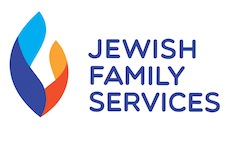
“As we discussed the logo, we naturally talked about our name,” he said. “We’ve been known in this community as Jewish Family Service Agency since 1958, but ‘agency’ is repetitive. Other Jewish organizations dropped that extra word from their name awhile ago and we felt that it made sense to do the same. We’re now referring to ourselves as Jewish Family Services or JFS. ‘Services,’ rather than ‘service agency,’ more accurately reflects the remarkable breadth of what we do.”
In addition to the new logo and look, Fruchter said, “We also have a new tag line, ‘Uplifting Lives.’ It’s exactly what we do here – we uplift the lives of families and individuals in our community who need our help. It works both ways, though – we also uplift the lives of our members and donors who are participating in tikkun olam and gemilut hasadim – repairing the world through acts of loving kindness.
“We’re proud to present these marketing initiatives on behalf of JFS to our community. We feel it’s a refreshing representation of who we are and the work we do, which is grounded in the values and mission of our organization.
“As we look ahead to the future,” he said, “our vision is to be a leader in the Jewish and broader communities, transforming the lives of individuals and families through quality services and innovative programming that responds to evolving community needs. With a new look, logo, name, tagline and website, we are more prepared than ever to do just that.”
The new website is now live at jfsvancouver.ca. JFS will be phasing out its old logo and branding materials by the end of 2017.
At the AGM, Karen James received the Naomi Gropper Steiner Visionary Award, given to a past board member who went over and above in their duties. She stepped into the top volunteer job at the agency at a critical time and guided JFSA to provide significantly more services to the community.
Shelley Ail received the Paula Lenga Award for her major volunteer contribution over a decade to the Jewish Food Bank and her commitment to coordinating volunteers and organizing JFSA’s annual Friends Campaign phone-a-thons.
Schara Tzedeck Congregation received the Community Partner Award.
JFS’s Volunteer Appreciation Award recipients were Ros Calof, for her work with the seniors lunch program, and Lina Moskaleva, for supporting its mental health outreach program.
The work of the staff was also celebrated – Staff Term of Service Awards went to Alan Stamp (10 years), Zanna Linskaia (10 years), Naz Gurbuz (five years) and Tanya Skovorodnikova (10 years).
Bill Kaplan, JFS board chair, introduced the new board members: Judith Cohen, Shannon Gorski, Peter Hotz, Simone Kallner and Michael Kaplen. Along with the nominating committee, Kaplan recruited a strong and talented group of community members.
***
The board of directors of Hillel BC Society has unanimously approved the appointment of Sam Heller as the next executive director of Hillel BC. The appointment will be effective July 1, 2018.
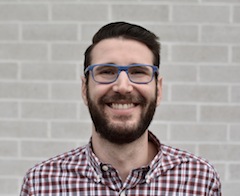
Over the years, Heller has repeatedly exhibited exceptional leadership skills in a variety of positions. While attending the University of British Columbia, where he received a bachelor’s in political science, he led the fight against antisemitism and anti-Israel activities on campus.
In an effort to make an even more significant contribution to the Jewish community, Heller moved to Israel and joined the Israel Defence Forces, where he achieved the rank of sergeant, Infantry Brigade, and earned an honour of excellence.
Heller returned to Vancouver and was hired by Hillel in 2015 to be the program/outreach coordinator responsible for directing social, cultural and educational programming at seven universities in the province. His ability to communicate with people of all ages, combined with his keen understanding of the campus and Vancouver Jewish communities, fluency in Hebrew and proficiency in social media marketing, have made him an invaluable member of the Hillel team. In recognition of these qualities, he was promoted to program director in 2016 and to managing director in June 2017.
Rabbi Philip Bregman will continue in a part-time basis as Hillel rabbi, whose duties will include Jewish chaplaincy and fundraising.

